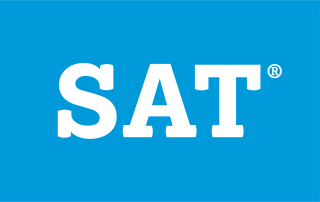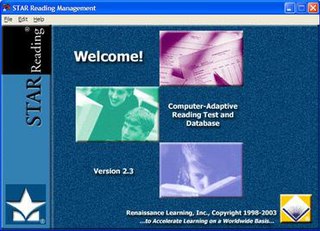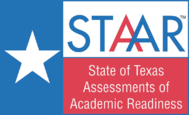Related Research Articles

The SAT is a standardized test widely used for college admissions in the United States. Since its debut in 1926, its name and scoring have changed several times. For much of its history, it was called the Scholastic Aptitude Test and had two components, Verbal and Mathematical, each of which was scored on a range from 200 to 800. Later it was called the Scholastic Assessment Test, then the SAT I: Reasoning Test, then the SAT Reasoning Test, then simply the SAT.

Standardized test is a test that is administered and scored in a consistent, or "standard", manner. Standardized tests are designed in such a way that the questions and interpretations are consistent and are administered and scored in a predetermined, standard manner.
Educational assessment or educational evaluation is the systematic process of documenting and using empirical data on the knowledge, skill, attitudes, aptitude and beliefs to refine programs and improve student learning. Assessment data can be obtained from directly examining student work to assess the achievement of learning outcomes or can be based on data from which one can make inferences about learning. Assessment is often used interchangeably with test, but not limited to tests. Assessment can focus on the individual learner, the learning community, a course, an academic program, the institution, or the educational system as a whole. The word "assessment" came into use in an educational context after the Second World War.

The No Child Left Behind Act of 2001 (NCLB) was a U.S. Act of Congress promoted by the Presidency of George W. Bush. It reauthorized the Elementary and Secondary Education Act and included Title I provisions applying to disadvantaged students. It mandated standards-based education reform based on the premise that setting high standards and establishing measurable goals could improve individual outcomes in education. To receive federal school funding, states had to create and give assessments to all students at select grade levels.
The High School Proficiency Assessment was a standardized test that was administered by the New Jersey Department of Education to all New Jersey public high school students in March of their junior year until 2014-2015 when it was replaced by the PARCC. Together with the New Jersey Assessment of Skills and Knowledge, which was administered in grades 3–8, the HSPA was part of a battery of tests used to assess student performance in New Jersey's public schools.

The Texas Assessment of Knowledge and Skills (TAKS) was the fourth Texas state standardized test previously used in grade 3-8 and grade 9-11 to assess students' attainment of reading, writing, math, science, and social studies skills required under Texas education standards. It is developed and scored by Pearson Educational Measurement with close supervision by the Texas Education Agency. Though created before the No Child Left Behind Act was passed, it complied with the law. It replaced the previous test, called the Texas Assessment of Academic Skills (TAAS), in 2002.
The California Assessment of Student Performance and Progress (CAASPP), known until February 2014 as the Measurement of Academic Performance and Progress (MAPP), measures the performance of students undergoing primary and secondary education in California. In October 2013, it replaced the Standardized Testing and Reporting (STAR) Program.
The Iowa Assessments also known informally as the Iowa Tests, formerly known as the ITBS tests or the Iowa Basics, are standardized tests provided as a service to schools by the College of Education of the University of Iowa. Developers Everett Franklin Lindquist, Harry Greene, Ernest Horn, Maude McBroom, and Herbert Spitzer first designed and administered the tests in 1935 as a tool for improving student instruction. The tests are administered to students in kindergarten through eighth grade as part of the Iowa Statewide Testing Programs, a division of the Iowa Testing Programs (ITP). Over decades, participation expanded and currently nearly all school districts in Iowa participate annually in the program, as do many other school districts across the United States. In a cooperative relationship, participating schools receive ITBS test materials, scoring and reporting services and consultation in the use of ITBS for instructional purposes, and ITP utilizes participation by schools in research and test development. Both the ITBS and Iowa Tests of Educational Development (ITED) were revised in the 2011–2012 school year. They were rebranded the Iowa Assessments. In 2016–2017, Iowa Assessments will roll out their new testing program, Next Generation Iowa Assessments.

STAR Reading, STAR Early Literacy and STAR Math are standardized, computer-adaptive assessments created by Renaissance Learning, Inc., for use in K–12 education. Each is a "Tier 2" assessment of a skill that can be used any number of times due to item-bank technology. These assessments fall somewhere between progress monitoring tools and high-stakes tests.
In an educational setting, standards-based assessment is assessment that relies on the evaluation of student understanding with respect to agreed-upon standards, also known as "outcomes". The standards set the criteria for the successful demonstration of the understanding of a concept or skill.
Curriculum-based measurement, or CBM, is also referred to as a general outcomes measures (GOMs) of a student's performance in either basic skills or content knowledge.
The Pennsylvania System of School Assessment (PSSA) is a standardized test administered in public schools in the state of Pennsylvania. Students in grades 3-8 are assessed in English language arts skills and mathematics. Students in grades 4 and 8 are also assessed in skills relating to natural science, including the field of data interpretation and analysis. Since 2013, high school students have taken the Keystone Exam in place of the PSSA for their standardized testing. The PSSA's were made by a company in New Jersey. The PSSA is written, owned and administered by Pearson Education. There are reporting categories for each subject which list eligible content to be tested in each grade. Assessment Anchors specify what is considered eligible content for each grade level tested. A Proficient or Advanced level is needed to be able to qualify as passing the PSSA.
Remedial education is assigned to assist students in order to achieve expected competencies in core academic skills such as literacy and numeracy.
The Common Core State Standards Initiative, also known as simply Common Core, was a multi-state educational initiative begun in 2010 with the goal of increasing consistency across state standards, or what K–12 students throughout the United States should know in English language arts and mathematics at the conclusion of each school grade. The initiative was sponsored by the National Governors Association and the Council of Chief State School Officers.
Placement testing is a practice that many colleges and universities use to assess college readiness and determine which classes a student should initially take. Since most two-year colleges have open, non-competitive admissions policies, many students are admitted without college-level academic qualifications. Placement exams or placement tests assess abilities in English, mathematics and reading; they may also be used in other disciplines such as foreign languages, computer and internet technologies, health and natural sciences. The goal is to offer low-scoring students remedial coursework to prepare them for regular coursework.

The State of Texas Assessments of Academic Readiness, commonly referred to as its acronym STAAR, is a series of standardized tests used in Texas public primary and secondary schools to assess a student's achievements and knowledge learned in the grade level. It tests curriculum taught from the Texas Essential Knowledge and Skills, which in turn is taught by public schools. The test used to be developed by Pearson Education every school year, although the most recent contract gave Educational Testing Service a role in creating some of the tests, under the close supervision of the Texas Education Agency.

In the United States, elementary schools are the main point of delivery of primary education, for children between the ages of 4–11 and coming between pre-kindergarten and secondary education.
The Texas Educational Assessment of Minimum Skills or TEAMS was the second standardized test used in Texas, from 1984 until 1990. It was used for grades 1, 3, 5, 7, 9 and 11. Students passing the test are no longer needed to take the exam. Passing the Grade 11, or Exit level, examination was required for graduation, but many opportunities for retesting were available. The TEAMS exam was replaced by the Texas Assessment of Academic Skills (TAAS) in 1990.
References
- ↑ "Chapter 1. Historical Overview of Assessment in Texas" (PDF). Technical Digest 2020–2021. 2021. Archived from the original on 3 March 2022. Retrieved 6 April 2022.
{{cite book}}:|website=ignored (help) - ↑ Confrey, Jere; Carrejo, David (26 October 2002). "A Content Analysis of Exit Level Mathematics on the Texas Assessment of Academic Skills: Addressing the Issue of Instructional Decision-Making in Texas". Written at Athens, GA. In Mewborn, Denise S.; Sztain, Paola; White, Dorothy Y.; Wiegel, Heide G.; Bryant, Royn L.; Nooney, Kevin (eds.). Proceedings of the Annual Meeting of the North American Chapter of the International Group for the Psychology of Mathematics Education (PDF) (Collected Works). Vol. 2: Research Reports, Short Oral Reports, Poster Presentations. Columbus, OH: ERIC Clearinghouse for Science, Mathematics, and Environmental Education. pp. 539–550. ISBN 978-0881190021. OCLC 936451045. ERIC ED471747 . Archived (PDF) from the original on 19 January 2022. Retrieved 6 April 2022. pp. 549–550:
Our research was focused on examining whether the data provided to teachers for instructional decision-making were valid for this purpose. We worked to extend the analysis of the data in relation to the published test structure, and found that there were a number of problems in reconciling the results.